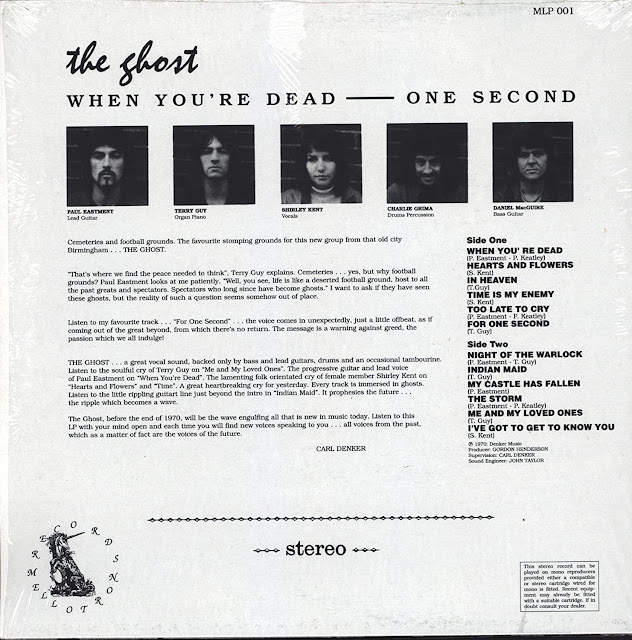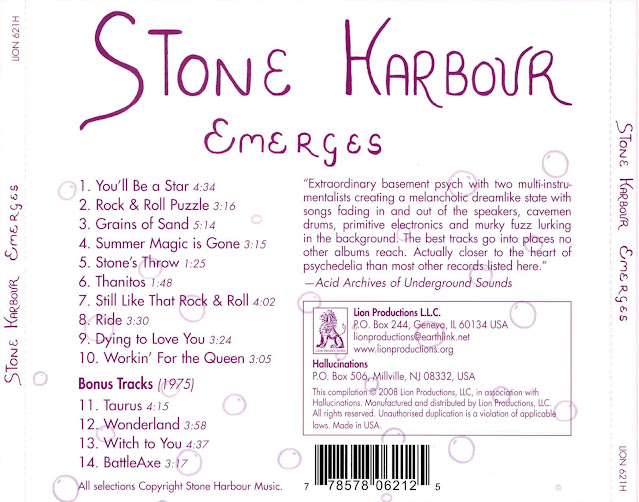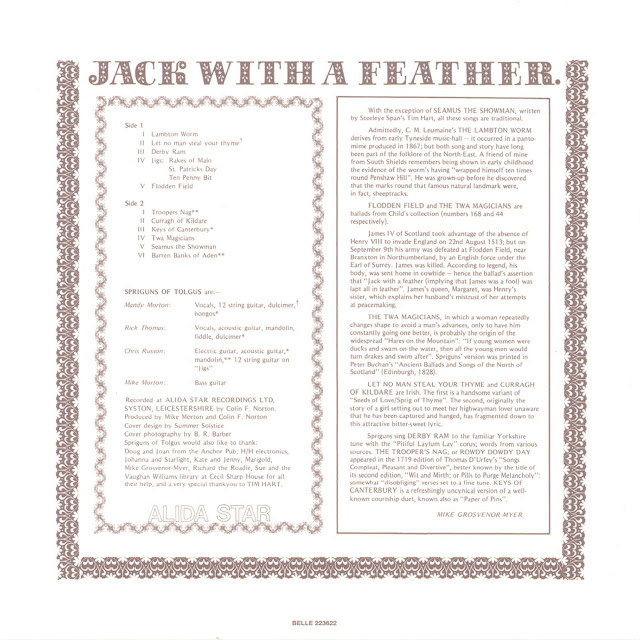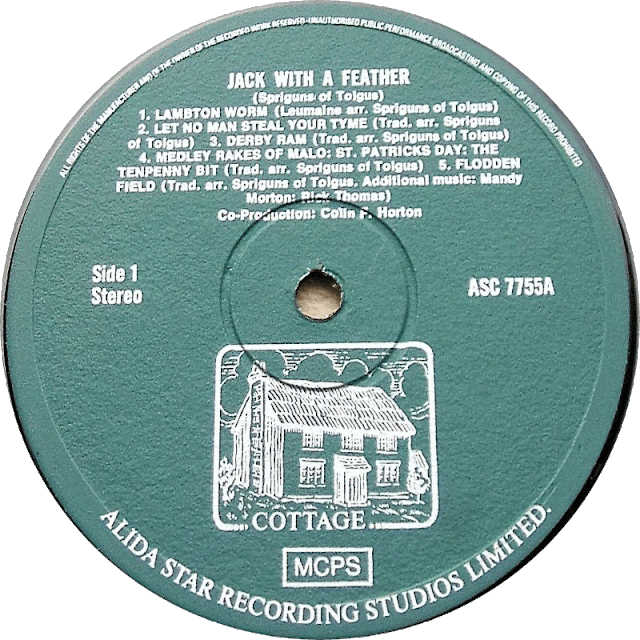Size: 91.5 MB
Bitrate: 256
mp3
Ripped By: ChrisGoesRock
Artwork Included
Ghost formed in Birmingham in the late sixties. They started out playing a heavish sort of blues-rock before they met up with singer Shirley Kent who'd already recorded two tracks on a charity EP, The Master Singers And Shirley Kent Sing For Charec 67 (Keele University 103) in 1966. Paul Eastment had earlier played in Velvett Fogg.
They recorded their album at the end of 1969, spawning their first 45 at the end of the year. When You're Dead was a strong song with a clear US West Coast influence. It was hardly Chart material, though, so predictably sales were poor. The album came out in January 1970. There's a clear contrast between the folk pieces that Shirley Kent sings on like Hearts And Flowers and Time Is My Enemy, which in style recall Sandy Denny's heyday in Fairport Convention, and the blues-rock numbers contributed by the rest of the band, of which For One Second sounds the strongest. Also worth checking out is the powerful Too Late To Cry. The album has now become a major collector's item, partly on account of its rarity but also on account of the breadth of its appeal to fans of both blues-rock and folk.
 |
| Reissue Back Cover |
The band returned to the studio in Spring 1970 to record I've Got To Get To Know You. Another track from their album, For One Second, was put on the flip, but when the 45 failed to sell the band slowly began to fall apart. Shirley Kent left to pursue a solo career and eventually released an album in 1975, Fresh Out, under the pseudonym Virginia Tree. I haven't heard it but it's reputedly folkier than Ghost's output and featured former band members Paul Eastment and Terry Guy on three of the tracks. After Kent's departure, the remaining band members soldiered on for a while using the name Resurrection but this later incarnation of the band didn't make it onto vinyl.
THE GHOST briefly appeared like a spectral vision in Birmingham, England in the late-1960's. Their hauntingly-titled one and only album "When You're Dead - One Second" rose from the grave in 1970 before the band just as quickly disappeared in a wisp of hazy smoke like a phantom apparition. The spooky album cover showed a ghostly translucent image of the five-piece band gathered around a large tombstone, headed by a Celtic Cross.
Right from the first few opening bars of "When You're Dead", you can tell we're going to be in for a weird and wonderful wild psychedelic ride here. This acid-drenched music is very reminiscent of the American band H.P. Lovecraft. In fact, The Ghost have such a strong resemblance to the American West Coast sixties sound that it's hard to believe they could be from the gloomy backstreets of Birmingham in England. This "phantasmic" bunch of Brummies really know how to Rock!
The Ghost are listed as Prog Folk on ProgArchives, but make no mistake, this opening number sounds like a wild Psychedelic Rock trip back in time to the flower-power freeway of love in San Francisco in the swinging sixties. In complete contrast, the second song "Hearts and Flowers" is a gorgeous Folk Pop refrain that could quite easily have been recorded by Peter, Paul & Mary or The Seekers. It's a truly beautiful melody floating along on a gentle wave of gorgeous guitar strings and uplifting harmonies.
This stunning song - featuring Shirley Kent on lead vocals - is a real gem that shines like a sparkling diamond and would have had tremendous hit potential if it had ever been released as a single. We're back on the magic bus again for "In Heaven", and if you love the sound of H.P. Lovecraft, then you'll be "In Heaven" too when you hear this absolutely fabulous psychedelic sixties song. It's groovy, baby! There's a return to gentler Folk Rock territory for "Time is My Enemy", a poignant song about the passing of the years which conjures up fond memories of the classic years of Sandy Denny and Fairport Convention, although this is more of an unconventional slice of Psych-Folk.
 |
| The Ghost - Portugal Picture Sleeve Single 1970 |
Shirley Kent sounds in magnificent voice on this hauntingly- beautiful song. It's a compelling blend of Sandy Denny's "Fotheringay" and "Who Knows Where the Time Goes", given a liberal psychedelic sprinkling of glowing rainbow colours. This is turning out to be a very good album indeed! Continuing with the intoxicating blend of storming Hard Rock songs and gentle Folk Rock refrains comes "Too Late To Cry", a rousing rip-roaring rocker, featuring an extended psychedelic wah-wah guitar trip back to the Streets of San Francisco in the hippy sixties, or the wild and untamed streets of Chicago in the case of H.P. Lovecraft.
 |
| The Ghost - Promo Single UK 1970 |
We're onto Side Two now "For One Second", which opens as a gently laid-back country-tinged melody, but wait one second because there's a surprise in store when the song metamorphosizes from a caterpillar into a bright and beautiful psychedelic butterfly for the storming crescendo of acid-soaked guitar reverb in the fabulous finale. And now we come to The Ghost's magnificent magnum opus, "Night of the Warlock", a spirited Demons and Wizards song that barrels along at pell-mell speed, taking the listener on a crazy helter-skelter ride in a headlong rush towards psychedelic nirvana.
This is like a maniacal harum scarum version of "Season of the Witch", wound up to 99 and given an energetic burst of adrenaline and raw power. We're off to meet the "Indian Maid" next, so you can expect to hear some exotic far-eastern vibes from the Indian sub-continent, although the song is still firmly rooted in western psychedelia. Either way, it's another great song wherever you are in the world. It's time now to mount the battlements for "My Castle Has Fallen", a storming medieval ballista firing a relentless percussive artillery barrage of pummelling Psychedelic Rock!
There's no let-up in the incredible pace either because "The Storm" is on the way, a thunder and lightning display of sonic energy to rattle the windows and light up the sky. It's not all Crash! Bang! Wallop! though, because there's a return to gentler climes for "Me and My Loved Ones", a bright rainbow sunburst of groovy psychedelic colours to close the album in magnificent style. Wait a minute though, we're not quite through yet, because there's the groovy sixties number "I've Got To Get To Know You" added as a bonus track.
The Ghost has risen from the grave of the psychedelic sixties era and reappeared as an awesome apparition fifty years later on ProgArchives. "When You're Dead - One Second" is an album full of haunting Folk refrains and spirited psychedelic acid trips. All in all, it's a heavenly album full of devilishly good songs.
- Terry Guy / organ, piano
- Shirley Kent / acoustic guitar, tambourine, lead vocals
- Paul Eastment / lead guitar, lead vocals
- Daniel MacGuire / bass
- Charlie Grima / drums, percussion
01. When You’re Dead (4:25)
02. Hearts And Flowers (2:54)
03. In Heaven (3:21)
04. Time Is My Enemy (4:06)
05. Too Late To Cry (5:04)
06. For One Second (5:25)
07. Night Of The Warlock (4:22)
08. Indian Maid (4:21)
09. My Castle Has Fallen (2:57)
10. The Storm (3:36)
11. Me And My Loved Ones (4:09)
12. I’ve Got To Get To Know You (4:02)
1. The Ghost
or
2. The Ghost
or
3. The Ghost
or
4. The Ghost


.jpg)

































